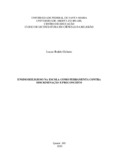| dc.contributor.advisor | Fraga, Laura Pippi | |
| dc.creator | Barreto, Raquel Peralta | |
| dc.date.accessioned | 2021-02-25T19:10:10Z | |
| dc.date.available | 2021-02-25T19:10:10Z | |
| dc.date.issued | 2020-12-15 | |
| dc.date.submitted | 2020 | |
| dc.identifier.uri | http://repositorio.ufsm.br/handle/1/20340 | |
| dc.description | Trabalho de Conclusão de Curso (graduação) - Universidade Federal de Santa Maria, Centro de Educação, RS, 2021 | por |
| dc.description.abstract | Religious Education in Brazil went through several phases. In the past, the Catholic Church has very strong milestones in the educational process and Religion classes were almost exclusively focused on it. After Law 9475/97, Religious Education in public schools lost its confessional character. The new teaching model becomes macro ecumenical, pluralist, interreligious and non-proselytizing, a reflection of the state's secularity. On the other hand, although the National Guidelines for the Undergraduate Course in Pedagogy define objectives and principles of the Course, it does not show the contribution that Religious Education can have in fulfilling these objectives and most Universities do not adequately contemplate Religious Education in their curriculum. The study, carried out through a bibliographic search, appears with the objective of investigating the challenges and perspectives of Religious Education in the Early Years of Elementary School. It was concluded that Religious Education in Elementary School faces many challenges, starting with the lack of theoretical knowledge and a proposal for school work, which means that the teacher, even without being prepared, has to assume a front posture to content for which it was not prepared. Religious Education is fundamental, as it is part of the knowledge that contributes to the formation of citizens. For these reasons, it is understood that he cannot be marginalized at school, starting with the initial training of pedagogues. Qualifying Pedagogy courses in Brazil is essential, as it is from the lack of qualification that the main challenges involving religious education arise. | eng |
| dc.language | por | por |
| dc.publisher | Universidade Federal de Santa Maria | por |
| dc.rights | Acesso Aberto | por |
| dc.rights | Attribution-NonCommercial-NoDerivatives 4.0 International | * |
| dc.rights.uri | http://creativecommons.org/licenses/by-nc-nd/4.0/ | * |
| dc.subject | Anos iniciais do ensino fundamental | por |
| dc.subject | Formação pedagógica | por |
| dc.subject | Ensino religioso | por |
| dc.subject | Early years of elementary school | eng |
| dc.subject | Pedagogical training | eng |
| dc.subject | Religious education | eng |
| dc.title | O ensino religioso nos anos iniciais do ensino fundamental | por |
| dc.title.alternative | Religious education in the early years of fundamental education | eng |
| dc.type | Trabalho de Conclusão de Curso de Graduação | por |
| dc.degree.local | Polo de Quaraí, RS, Brasil | por |
| dc.degree.graduation | Ciências da Religião | por |
| dc.description.resumo | O Ensino Religioso no Brasil passou por diversas fases. No passado, a Igreja Católica possui marcos muito fortes no processo educacional e as aulas de Religião voltavam-se quase que exclusivamente a ela. A partir da Lei 9475/97, o Ensino Religioso nas escolas públicas perdeu seu caráter confessional. O novo modelo de ensino, passa a ser macro ecumênico, pluralista, inter-religioso e não proselitista, um reflexo da laicidade do Estado. Por outro lado, apesar das Diretrizes Nacionais para o Curso de Graduação em Pedagogia definirem objetivos e princípios do Curso, não evidencia a contribuição que o Ensino Religioso pode ter no cumprimento destes objetivos princípios e a maioria das Universidades não contempla adequadamente o Ensino Religioso em sua grade curricular. O estudo, realizado por meio de uma pesquisa bibliográfica, surge com o objetivo de investigar os desafios e perspectivas do Ensino Religioso nos Anos Iniciais do Ensino Fundamental. Concluiu-se que o Ensino Religioso no Ensino Fundamental se depara com muitos desafios, iniciando pela falta de conhecimento teórico e de uma proposta de trabalho da escola, o que faz com que o docente, mesmo sem estar preparado, tenha que assumir uma postura frente ao conteúdo para o qual não foi preparado. O Ensino Religioso é fundamental, pois faz parte dos saberes que contribuem para a formação do cidadão. Por estes motivos, entende-se que ele não pode ficar marginalizado na escola, começando na formação inicial de pedagogos. Qualificar os cursos de Pedagogia no Brasil é indispensável, pois é da falta de qualificação que surgem os principais desafios envolvendo o ensino religioso. | por |
| dc.publisher.country | Brasil | por |
| dc.publisher.initials | UFSM | por |
| dc.subject.cnpq | CNPQ::CIENCIAS HUMANAS::TEOLOGIA | por |
| dc.publisher.unidade | Centro de Educação | por |



